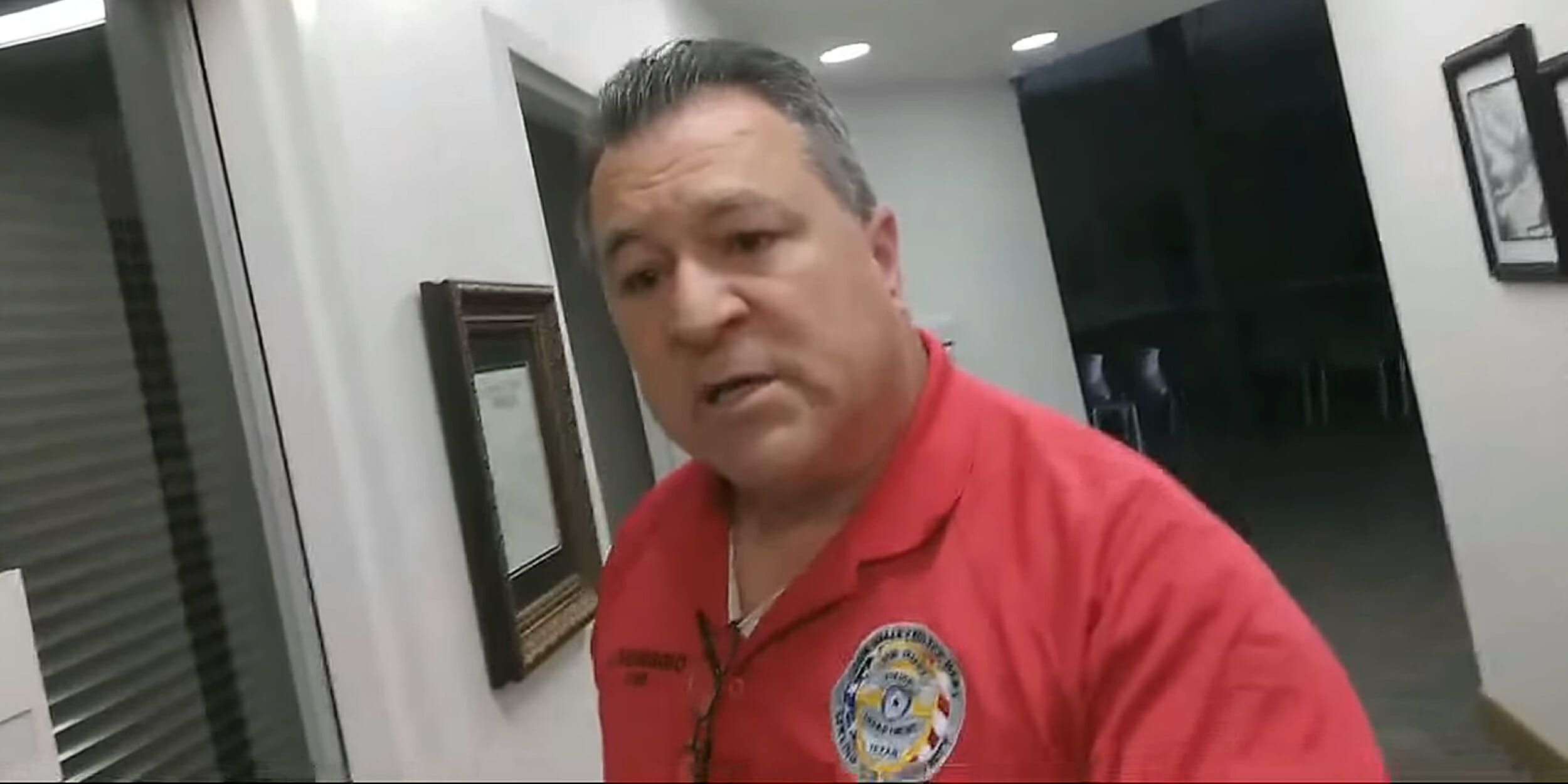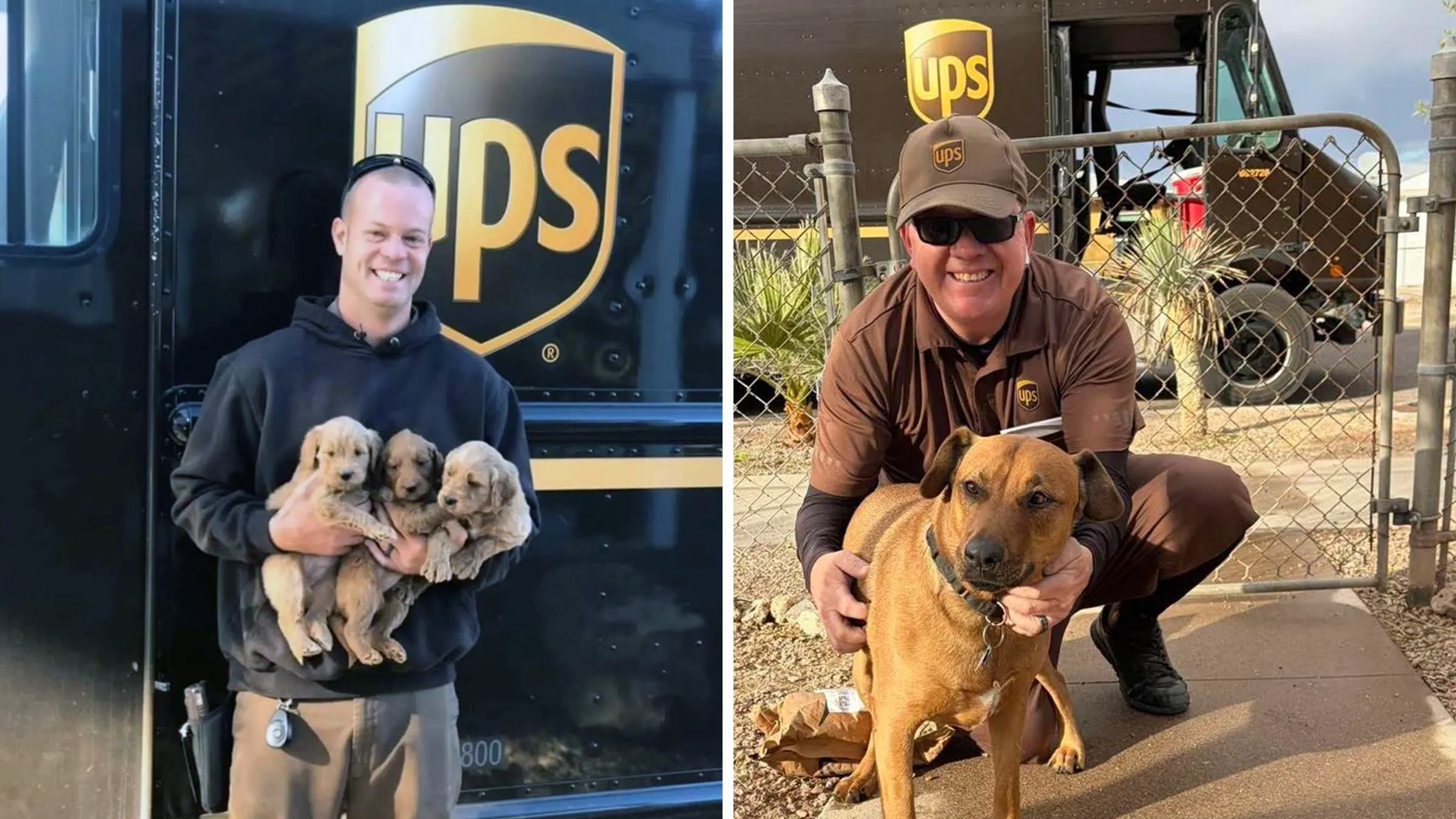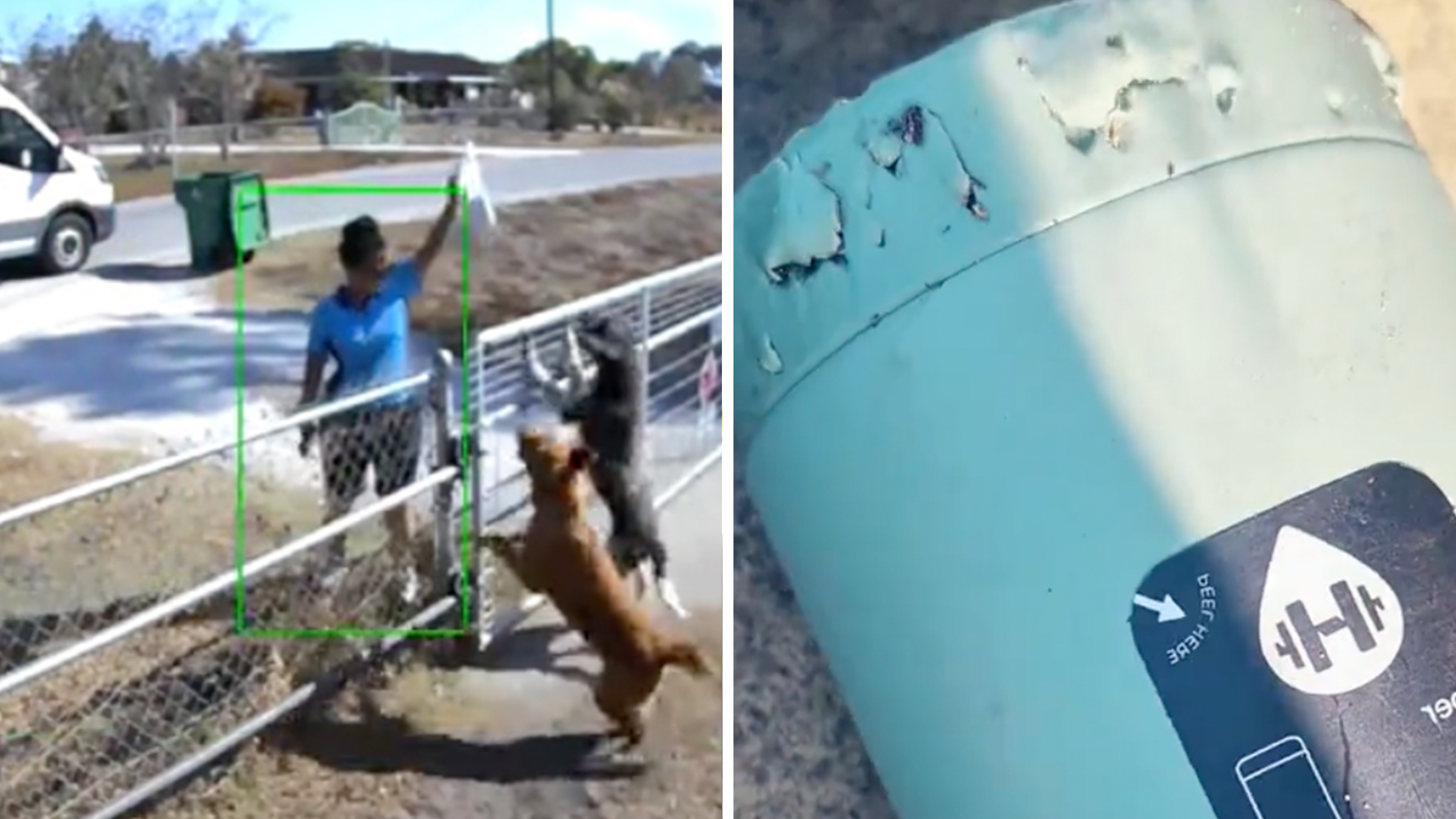In the past few years, millions of politically charged constituents have stepped outside to air their grievances against the government. The 2018 Women’s March saw 300,000 estimated attendees peaceably demanding change; the March for Our Lives gathered approximately 1.2 million protesters across 800 cities. But in Texas, a gathering of fewer than 20 people completely upended the small town of Leon Valley.
By 4pm, the rally was a scene of utter chaos: Livestreams ended with phones being ripped from hands, people wound up in handcuffs, and some who had spent weeks planning to come to Leon Valley to stand up for a cause found themselves in the back of a police van.
In the aftermath, one person was hospitalized, five were criminally prosecuted, and a dozen others filed lawsuits—all stemming from an advocacy event to stand up for the First Amendment.
“These people are crash dummies,” Solomon Radner, an attorney for some of those arrested, said. “If the dummy gets torn up, you know the car isn’t safe.”
…
The imbroglio in Leon Valley started with a man with the online alias Mexican Padilla, who had recently become familiar with YouTube videos published by a growing group of self-described “First Amendment Auditors.”
This loose-knit group of online activists routinely films the exteriors or lobbies of public buildings such as post offices, city halls, and police stations to see if officials will respect their First Amendment right to film, which is becoming an essential part of 21st century citizenship.
This growing trend in online activism has garnered the attention of local police and federal officials alike across the country who routinely end up in viral confrontations with the self-described activists—like in Leon Valley in June.
The auditors date back to the 1980s and have their roots in the work of Diop Kamau, a California police sergeant who became disillusioned by the racism and brutality he witnessed his peers committing. In 1994, he founded PoliceAbuse.com, which attempts to track and document overreach by authorities. His organization employed undercover operatives armed with hidden cameras to audit police departments. In many cases, cities hired Kamau to conduct audits of their departments. Other times, local news stations would hire the auditors to investigate allegations of misconduct.
Kamau’s group was invited to perform these audits in over 100 cities, and their work resulted in legislation in California that made it a felony for police officers to falsify reports. Now, Kamau’s work has found acolytes in the internet age, born and bred on YouTube. And the movement has become so popular that for every person standing outside a local police station or courthouse with a camera, there are hundreds more behind a computer screen ready to flood department Facebook pages with one-star reviews or call the department to complain the moment an officer detains or arrests an activist.
…
Mexican Padilla—a 27-year-old named Jesus Padilla—is among those YouTube activists, and he has dabbled in First Amendment audits before, filming a few videos of various buildings and officers when he came across them. In one incident in San Antonio, while filming officers responding to an unconscious person, Padilla was arrested along with another auditor, who was tackled to the ground while filming.
So it’s no surprise that after Padilla claimed he had a run-in with a police cruiser in Leon Valley on the outskirts of San Antonio, he headed straight to the Leon Valley Municipal Building, camera running, to file a complaint.
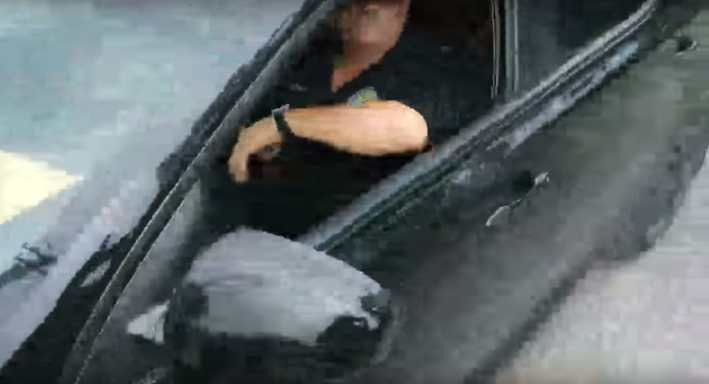
According to Glik v. Cunniffe, citizens have the right to film anything in public view. Thus Padilla felt he had every legal right to record the interior of the building, which houses the town’s police station, city hall, and courts.
In the video, no one seemed to mind at first; Padilla even asked a city official where he was allowed to go and was told by the official he could enter the hallway that led to the city administrator’s offices.
After going down that hallway, Padilla ended up outside the office of Chief of Police Joseph Salvaggio, who promptly confronted him.
Salvaggio claimed in the video that Padilla was filming a restricted area, and the two got into a heated verbal sparring match, which ended with Padilla cursing out the chief in Spanish—Padilla’s videos are filled with insults hurled at police officers—and getting thrown to the ground by Salvaggio.
Court records show Padilla was charged with criminal trespassing, resisting arrest, and harassment of a public servant. He was also given a trespass warning preventing him from being allowed back on the premises.
After publishing his video, Leon Valley became a focus of activists, who felt Padilla’s First Amendment rights were infringed.
Daymond Jones, a former police constable who identifies with the auditors, says that the activists are just testing whether Texas law enforcement officers hold true to their training.
“[We] know exactly what the law says, and we know we were taught at the academy, in Texas. If someone says ‘fuck you,’ you can’t be personally insulted, you can’t just charge them with disorderly conduct,” Jones says. “You cannot take it personal; you can not retaliate.”
By attacking Padilla after the insults, the auditors say that Salvaggio broke the law. And since then, they’ve had it out for him.
…
Another auditor going by the name TXsheepdog72, real name Jack Miller, who was arrested with Padilla in San Antonio a week earlier, was watching Padilla’s video. He noticed something else entirely—a sign on the door of the building that banned weapons from being brought inside.
Miller, who previously served for a decade in law enforcement, felt that the sign violated Texas’ open-carry law. So he showed up to the building holstering a fake rubber firearm and proceeded to ask for paperwork so he could file a complaint with the attorney general.
The auditor expected the police would assume the rubber training gun in his holster was real and try and arrest him for bringing it inside the building. Instead, a detective and lieutenant simply ordered Miller to leave, and he later filed his complaint without incident.
But around midnight that night, the Leon Valley police raided Miller’s home, where they arrested him on felony charges of entering a place where weapons are prohibited. The SWAT team also confiscated his cameras, computers, and modem, which they’ve yet to return as of publication, according to Miller.
“Leon Valley was trying to make all these other departments believe I was some dangerous guy and they’d come kick my door in,” Miller said about the incident on YouTube.
He noted on video what they took, a list of items he says is much larger than either what the warrant specified or the list of equipment he had when he was at the station.
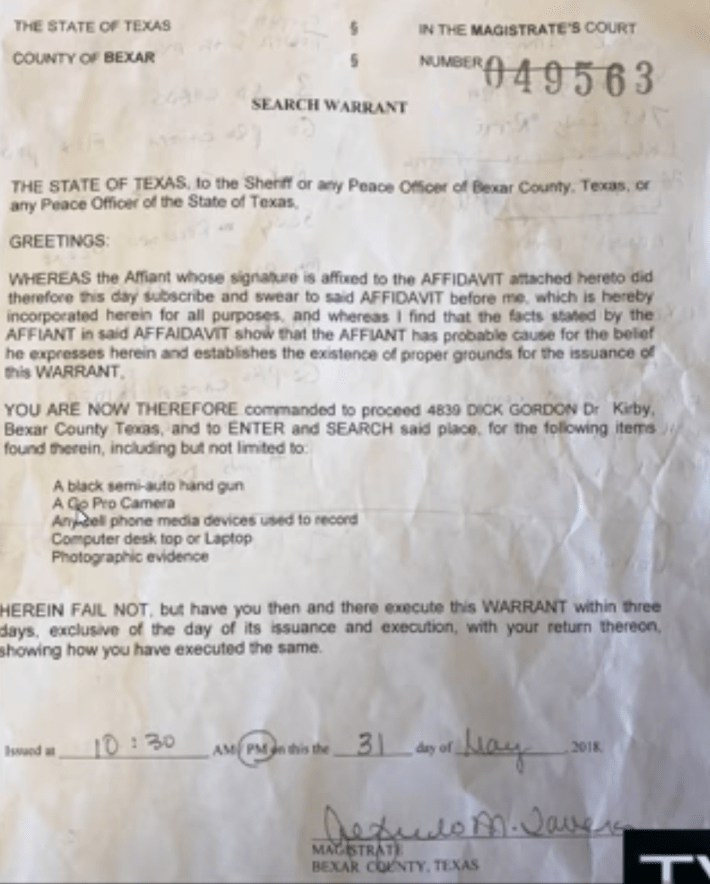
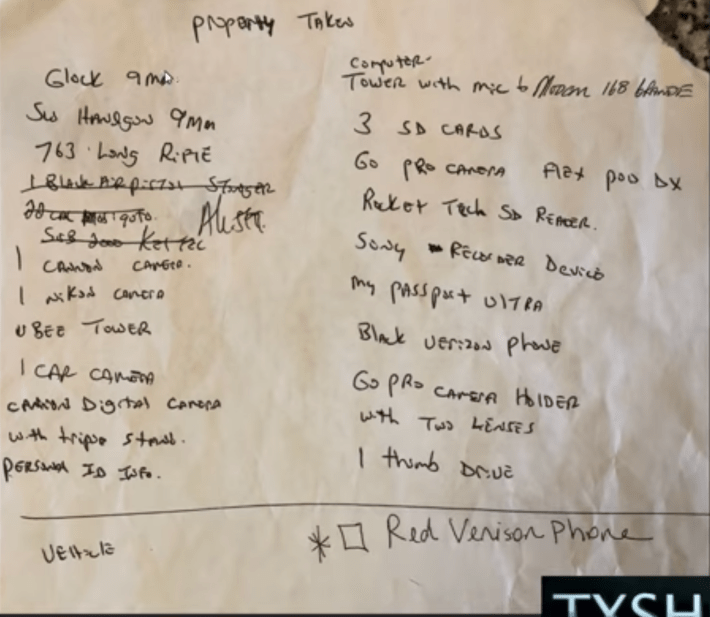
Like with Padilla, Leon Valley issued a criminal trespass warning against Miller, banning him from Leon Valley public property.
It’s then when people began to rally.
…
Another activist named Mark Brown visited the municipal building with Padilla a few days after the incident with Miller. After being denied entrance to the building because he was holding a camera, Brown was then tased, and police broke several ribs while arresting him.
“This is a public sidewalk,” Brown insisted as an officer knocked the phone from his hand. Moments later, he appears to be arrested.
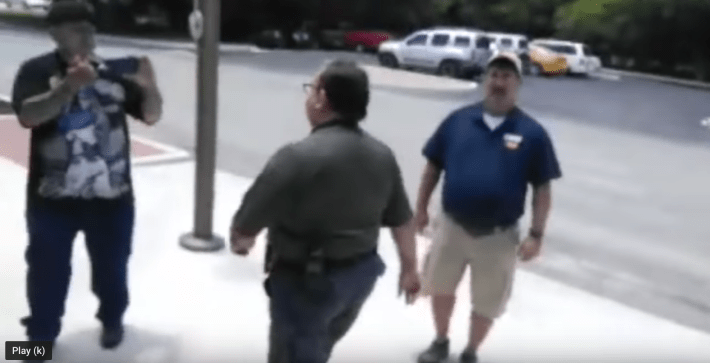
Four days after, another prominent activist named James Freeman attempted to stage a protest outside of the police station, along with several other activists. During the protest, Freeman stepped on a pro-police “Thin Blue Line” flag. Salvaggio then ordered Freeman and the others to be arrested and had his officers confiscate the cameras and phones of everyone near the scene of the arrest―including those not involved in the protest.
According to court records, during the arraignment, the judge refused to accept the charges over lack of evidence and let the protesters go.
Freeman says he discovered that his car had been towed, despite it being parked at a nearby private lot where he had permission. Freeman blamed Salvaggio, and after visiting the impound lot, he claimed a firearm which he had a permit to carry was missing from inside it.
Likely in response to the number of YouTube activists who had begun attempting to film the lobby, a local municipal judge signed an order which determined that filming was to be banned inside of court buildings.
Signs were put up displaying the order, and even locals who tried getting inside for official business were told they weren’t allowed to bring their phones with them out of fear they may record.
Activists attempted to share their problems in person at a city council meeting, so the council passed an impromptu rule requiring any member of the public to provide ID proving that they lived in Leon Valley before they were allowed to speak before the council.
“Leon Valley, y'all really screwed up big this time,” famed auditor Phillip Turner said in a video after traveling to the town and discussing the aftermath of his attempts to de-escalate the situation.
After tensions had reached their breaking point, many of the most prominent members of the movement decided to travel to Leon Valley and stage a public protest outside of the police station.
According to the videos showing the protest, around two dozen activists showed up on June 23. On their channels they said some of them had traveled from as far away as Michigan, California, and Florida to be there. Many were prominent members of the movement and some had backgrounds in law enforcement themselves.
One activist, Daymond Jones, who observed the protest, was a former police chief who currently serves as an elected constable in Alabama.
“It was a stalemate, a stonewalling by the chief of police,” he told the Daily Dot.
Most of the activists stood on the sidewalk in front of the station holding cameras and livestreaming the protest across the internet, while others held signs.
One person at the protest, an Iraq War veteran who was later charged named Bao Nguyen, stood for much of the event, livestreaming on a public easement by a traffic light across from the building. During the livestream, he’s shown explaining to drivers who were waiting for the light to turn green what the protest was about.
According to Jones, many of the locals who the group talked to sounded sympathetic to their cause; some even confided that they had experienced similar problems with the local police as well.
Just this week, a local family filed a lawsuit in an unrelated incident after they were held at gunpoint during a drug raid which the police claim was a mistake and others claim was retaliation. Lucil Basco said that after getting pulled over for a minor traffic infraction, Leon Valley police smashed down her door.
Jones, who has been focused on Salvaggio, said he’s heard plenty of complaints about the chief.
“Salvaggio has a big problem with telling the truth, and he tries to contort the truth, law, and policy to fit his needs. He’s a poor example of a police officer, and he’s a control freak.”
On June 23, he was also accused of flat-out lying.
The protest was winding down over when Salvaggio went to the crowd and announced there would be a press conference in 20 minutes, which they should attend.
Some thought Salvaggio would announce they were lifting the policy that restricted filming, but when the time came and they gathered for the press conference, Salvaggio instead ordered his officers to detain everyone there. Not only were the activists handcuffed, but the children of the owner of a convenience store located next to the municipal building ended up being detained as well.
The owner of the convenience store later claimed that since the day of the protest, police had been harassing him, loitering in his parking lot and confronting him over having offered some of the activists water the day of the protest.
The reason Salvaggio gave for the protesters’ detainment was that on two of the livestreams, a user posted Salvaggio’s home address in the chat. The chief alleges that even though the activists weren’t the ones to post his address, due to the fact it was posted on the chat of their channels, they are ultimately responsible. (Several court cases have ruled publishers can’t be held liable for comments posted on their sites.)
Everyone in attendance had their cameras and phones confiscated by police. According to one person in attendance, Theresa Richards, Salvaggio told many of the protesters at first that if they signed a document giving police permission to download the contents of the phones, they could have them returned.
According to protesters, after several of them agreed and signed the document, they say Salvaggio claimed to have changed his mind. Salvaggio later offered the protesters a chance to receive their property back if they signed a waiver that stated the police couldn’t be held legally responsible for seizing it. No activist agreed to sign.
Months later, court records show that police continue to refuse to return the property that was seized during the June 23 protest.
On the video capturing the arrests, Salvaggio demands that everyone at the protest provide ID. Despite doing so, many remained in handcuffs for several hours afterward, and at least one activist who had their driver's license confiscated has still not had it returned.
Several activists reported being threatened by police and “hotboxed,” a practice in which police will put a person in a room without any ventilation or air conditioning and deny them access to water for extended periods of time. According to witnesses, the elderly father of one activist who had accompanied his son to the protest ended up collapsing from heat stroke while in custody.
Court records show that a county judge again refused to accept lesser charges of resisting arrest and interfering with duties of a public servant, and some of the protesters were released the next day.
The judge didn’t dismiss the felony charges of obstruction or retaliation, however, a crime that carries a sentence of up to 10 years in prison.
Warrants were issued in connection to the case demanding Google give access to the emails of many of the activists involved in the protest who were never charged with a crime. The auditors consider such a warrant a fishing expedition by police, and the federal judge handling the case issued a restraining order preventing that information from being released. The Daily Dot reached out to Google for a comment on the subpoenas and was told that company policy prevents the company from commenting about user data requests.
“I think Chief Salvaggio has shown his true anti-American beliefs. His attempts at subpoenaing the Google accounts of people who are not charged with any crimes and only participation in the event is despicable and truly the acts of a police state,” David Warden, an activist who was detained and who is now suing the city, told the Daily Dot.
Charges are still pending against the activists; so far at least 12 of them have filed a lawsuit against Salvaggio and the town.
…
For his part, Salvaggio has denied any wrongdoing, and when asked for comment on the case, told the Daily Dot he is unable to say anything due to pending litigation. He’s continued to receive local support.
Kelly Kuenstler, the city manager, was unconcerned about the suits, noting the town's liability insurance covers civil rights lawsuits. City officials also claim they had been receiving threats over the videos.
“It’s not about the First Amendment. This is all about money. These people make money posting videos to YouTube or suing local government. They’re all anarchists.” Salvaggio claimed while speaking to local news sites. Salvaggio has also alleged that he is working with the FBI to investigate the auditors, even hinting during a deposition that the local district attorney may indict hundreds of more people in connection to the case.
The attorney for some of the auditors disagrees with Salvaggio's suggestion.
“What they are doing is no different than an undercover TSA agent trying to see if they can sneak a weapon past the metal detector,” said Rander, saying auditors were trying to ensure that government agents acted responsibly.
Radner was so outraged by the conduct he witnessed occurring in Leon Valley that he flew from Michigan to represent protesters in court. “My clients broke no laws," he said. "Filming police is legal. Period.”
Radner continued: “I don’t know what’s worse: if the officers didn’t know what the law was or if they just didn’t care. But to try and make up ridiculous excuses afterwards to justify arresting my clients and seizing their property is beyond shameful.”
Similar cases to this one in the past have resulted in multimillion-dollar settlements, and Radner implied he expects actions of the city officials will cost the town a substantial amount.
Like Radner, Andrew Froelich, the attorney representing Padilla has asserted his client hasn’t broken any law and that the situation was only escalated by police. Froelich told the Daily Dot that Padilla is afraid for his safety after saying he received a number of online threats on social media by users portraying themselves as police officers.
With the first of the lawsuits beginning to make its way through the court system, the situation is far from over.
But already it seems that Leon Valley can serve as a cautionary tale for any who might underestimate the power that a few YouTubers might hold—or the power that the state can wield when it wants to.
